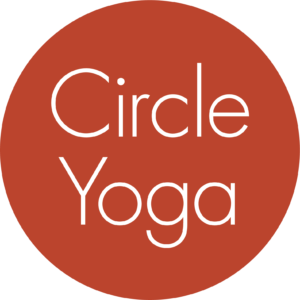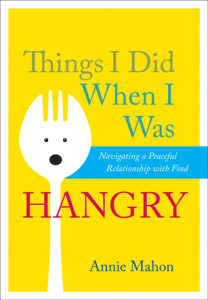September 2015
Things I Did When I Was Hangry: Navigating a Peaceful Relationship with Food by Annie Mahon
This edition of “Thoughts from Annie” is excerpted from Annie’s new book, released just this month by Parallax Press. Things I Did When I Was Hangry is available for purchase in the Circle Yoga shop. Please join us at the studio to celebrate Annie’s new book this Sunday, September 20th, 6:30-8:00pm. Register now to reserve your space.
It’s just after our nightly family dinner, and I pick up a dinner plate. The kitchen is overflowing with dirty dishes, all four kids are tearing around the house yelling and whining and definitely not doing their homework, and my husband and I haven’t had sex in weeks. He was late for dinner tonight, as always, and now we are yelling at each other from across the kitchen. I feel the anger boiling up inside of me. I don’t want to be there, and I don’t want to keep arguing. I don’t want to force the kids into doing all the things they don’t want to do tonight. I’ve been eating nonstop since I began preparing dinner, and now I’m full and furious at myself. I just want to go to bed. Before I know it, the plate has left my hand and is flying angrily toward Paul’s chest before it crashes into the wall, spewing a million pieces into the open dishwasher. Why am I so angry?
NEITHER PAUL NOR I CAN REMEMBER specifically what we were fighting about that night. I remember thinking that it was all Paul’s fault. He was to blame for all of my unhappiness. “If only he could come home on time. If only he could help me more with the kids. If only he could stop telling me what to do.” It felt better to think that everything bad was his fault than that I was angry or depressed.
I worried about whether our family was okay. Paul’s CPA father euphemistically called us “passionate,” and we were definitely that. Lucile started rebelling at nine (“I don’t give a damn what you say, I am not going to soccer practice!”), Jamie was developing a distressing perfectionism (“I’m soooo stuuupid!”), Veronica couldn’t eat off plates that were white, and Louie was sent home from kindergarten for looking up girls’ dresses. It was hard to resist thoughts of checking out when there were so many strong emotions.
Paul escaped to work, perfecting the traditional role of provider, which put me in the position of managing all the child-care and household responsibilities along with my graduate schoolwork. I loved my family, but I was lonely, tired, and annoyed. I thought my new mindfulness practice would make me feel better, but so far it had been more like taking the cork out of a bottle of champagne. My emotions still had to bubble over for a while before they could settle back down. With mindfulness, my feelings seemed so much more tangible than they had been when I was suppressing them with food and alcohol. Sometimes I could notice them and not act on them, but sometimes I couldn’t help but react.
This was one of those times that I could see my emotion, my fury at my husband, and I was conscious that I was about to do something I’d have to apologize for later. I could feel it coming, but I didn’t have enough mindfulness practice under my belt to be able to stop it. I saw the plate; I felt the anger. My spacious mind said, “This is anger,” and my reptilian brain said, “Throw it at him!” I picked up the plate, my jaw tensed, and I felt a moment of power in my hands, just what I needed. I wanted to stop there, but the neural pathways of anger were too well worn, and I let the plate go. It was major progress that I was now aware of my feelings and my impulses to act on them—I just couldn’t control the outcome yet.
This incident was a perfect example of the second arrow and the power of conditioning. My annoyance at the situation, my fatigue, and my loneliness were uncomfortable emotions. Instead of just taking care of my own feelings, I shot myself with the second arrow. I blamed my husband for all of it. I told myself that it was his fault. For a short time my anger felt really good, but the loneliness and fatigue didn’t go away. They were simply compounded by the feelings of shame and isolation that arose after the plate came smashing down and Paul retreated. In time I was able to change those patterns, but it didn’t happen overnight.


Wow! I happened upon this in my inbox. This pretty much describes my situation for many years. Unfortunately, even after trying to fix things; i.e. myself, my husband left. Now I am MORE tired and lonelier than ever. I keep thinking I should write about it; journal at the very least. But, I don’t make the time. I have two children…need I say more? Oh well. It sounds like a great book.
I’m glad you could relate to this, but sorry that your situation is more difficult now… journalling and writing have definitely helped me process a lot of stress. You might also consider (if you don’t have one already) starting a meditation practice and joining a meditation group. There’e more info on our site under “mindfulness”. warmly, annie.
Thanks for the response. I will look into the meditation. That is a good idea…nothing else has worked. 🙂
Annie- you are such a great writer! I felt as though I was right there with you! I am sorry our worlds don’t seem to overlap…Warmly, Jill
Thanks, Jill! Hope to see you some day soon. xo